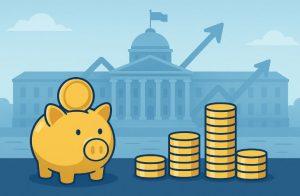As the UK moves into a new financial era under Labour’s economic strategy, one of the most closely watched topics for savers and investors is the anticipated savings tax reforms led by Rachel Reeves. Serving as the Chancellor of the Exchequer, Reeves has signalled potential adjustments that could reshape how UK residents manage their savings and investments.
These changes have stirred curiosity and concern among Londoners and financial professionals alike. Understanding how these proposed savings tax updates might affect different income groups, savings accounts, and long-term financial planning is crucial.
What Are Rachel Reeves’ Proposed Changes to the UK Savings Tax?

Rachel Reeves has indicated that changes to the UK savings tax system are part of her broader economic strategy. While the full policy framework is yet to be officially published, financial analysts expect adjustments that could include:
Reduction in Personal Savings Allowance
Currently, basic rate taxpayers enjoy a £1,000 tax-free allowance on savings interest, while higher rate taxpayers receive £500. Analysts speculate that Reeves may lower these thresholds to increase tax revenue and support public spending initiatives.
Adjustment to Interest Taxation
Another anticipated change involves altering how interest income is taxed. This may mean that more savers who previously stayed within their allowances could now face taxable interest.
How Could These Tax Changes Impact UK Savers?
The impact of savings tax reforms will differ depending on an individual’s income level, savings amount, and investment choices.
Increased Tax Burden on Higher Balances
Individuals with large savings in standard bank accounts or non-ISA savings could experience a noticeable increase in tax liability, especially if their annual interest exceeds the adjusted thresholds.
Influence on Savings Behaviour
History shows that when savings tax policies tighten, savers often shift to tax-efficient accounts like ISAs or consider investing in diversified portfolios rather than keeping cash in standard accounts.
Effect on Retirees and Passive Savers
Retirees or individuals relying heavily on interest income may be among the most affected, particularly if these changes reduce their tax-free benefits.
Why Is the Government Considering Changes to Savings Tax?
Rachel Reeves has positioned these potential savings tax reforms as part of a wider economic plan aimed at:
Boosting Fiscal Revenue
By collecting more tax from interest earnings, the Treasury can support its public investment programmes and social spending initiatives without resorting to broader income tax hikes.
Encouraging Productive Investment
Tightening savings tax benefits may indirectly push more citizens toward productive investments, such as government bonds, stocks, or ISAs, rather than leaving large cash reserves in low-interest accounts.
Aligning Tax Policy with Labour’s Economic Vision
Labour’s fiscal narrative under Reeves focuses on fairness and sustainable growth, which could involve ensuring higher-earning savers contribute more to the economy.
Which Savings Accounts and Investments Are Most Affected?
Different financial products will experience varied levels of impact under the new tax approach. Here’s a detailed table comparing potential effects on popular savings and investment options:
| Savings/Investment Type | Current Tax Position | Expected Impact under Reeves’ Proposal | Tax Mitigation Options |
| Standard Bank Savings Accounts | Interest taxable after personal allowance | Lower allowance may trigger more taxable interest | Move funds into ISAs |
| Cash ISAs | Interest fully tax-free | Likely unaffected | Maintain or increase ISA savings |
| Stocks & Shares ISAs | Dividends and capital gains tax-free | Likely unaffected | Diversify holdings |
| Premium Bonds | Prizes tax-free | Likely unaffected | Continue participation |
| Fixed-Term Bonds (non-ISA) | Interest taxable above allowance | Higher tax liability expected | Opt for ISA-linked bonds |
| Corporate Bonds / Gilts | Interest taxable based on status | Possible increase in tax for high interest yields | Use within ISA wrappers |
Can UK Investors Reduce the Impact of Higher Savings Taxes?

Although changes to savings tax could tighten the net for many savers, there are strategies to legally reduce the impact.
Maximising ISA Contributions
Individual Savings Accounts remain the most tax-efficient savings vehicle. Transferring funds from standard accounts to ISAs can protect future interest from taxation.
Using Government Bonds and Tax-Free Products
Products like Premium Bonds and NS&I tax-free options can help maintain income without additional tax burdens.
Considering Diversified Investments
Shifting part of your savings into stocks, shares, or bond ISAs not only mitigates tax exposure but can also generate potentially higher returns over time.
What Are the Long-Term Financial Implications of These Changes?
The long-term effects of Reeves’ savings tax adjustments will likely extend beyond immediate tax bills.
Changes in Saving Habits
Financial analysts anticipate a behavioural shift, with more individuals moving funds into ISAs and low-tax investment products.
Boost for Financial Planning Services
As tax rules become more complex, financial advisors and tax planners will play a larger role in guiding individuals to optimise their savings.
Potential Slowdown in Cash Savings
If the returns on post-tax interest diminish, UK savers may reduce traditional cash deposits, impacting banks’ liquidity models.
How Should Londoners and UK Residents Prepare for Potential Changes?
Preparation is key to minimising the effects of savings tax adjustments.
Assess Current Savings Portfolio
Evaluate how much of your savings currently earn taxable interest and whether this exceeds your projected new allowance.
Explore ISA and Tax-Free Options
Consider maximising ISA allowances before the next tax year to shield future earnings.
Stay Informed on Official Announcements
Monitoring Treasury updates and Rachel Reeves’ official statements will help savers act proactively rather than reactively.
How Might Businesses and Entrepreneurs Be Indirectly Affected by Savings Tax Changes?

While the savings tax primarily targets individual savers, its ripple effects can reach small business owners and entrepreneurs.
Reduced Disposable Income for Investment
If individuals experience higher tax on savings interest, their disposable income decreases, which may affect their willingness to invest in small businesses, startups, or entrepreneurial ventures.
Impact on Company Directors and Dividend Strategies
Directors of small companies who rely on a mix of salary, dividends, and savings interest could see their overall tax burden rise. This may encourage some to reinvest profits into the business rather than keeping cash in taxable savings accounts.
Shift Toward Corporate Investment Products
Some entrepreneurs might explore corporate savings products or business ISAs (where applicable) to shield company reserves from unnecessary taxation.
This indirect chain effect shows that Reeves’ savings tax strategy is not just a personal finance concern but also relevant to the wider UK startup ecosystem.
Could Savings Tax Changes Influence the UK Housing and Mortgage Market?
Savings tax policies can have secondary effects on property markets, particularly in London and major UK cities.
Impact on First-Time Buyers
If savers are taxed more heavily on interest, first-time buyers may struggle to grow their deposit savings efficiently. This could delay home purchases and soften demand in some property segments.
Influence on Buy-to-Let Investors
Landlords and buy-to-let investors who keep rental income as cash savings may face higher tax bills, prompting them to either reinvest in properties or move funds into tax-efficient investments.
Potential Cooling of the Housing Market
If many prospective buyers or investors hold back due to reduced net savings, the housing market could experience a temporary slowdown, particularly in urban areas where savings accumulation is key to mortgage eligibility.
Conclusion
Rachel Reeves’ anticipated savings tax reforms signal a shift towards a more revenue-focused fiscal approach in the UK. While savers may face a higher tax burden, proactive planning with ISAs, Premium Bonds, and diversified investments can mitigate financial impact.
Staying informed and acting before official changes take effect will be crucial for Londoners and UK residents looking to protect their hard-earned savings.
FAQs About Savings Tax Changes
Will these changes affect my existing ISA accounts?
No, ISAs are expected to remain tax-free, so interest or returns within existing accounts will not be impacted.
When will Rachel Reeves announce the final savings tax changes?
The exact timeline is unconfirmed, but analysts expect announcements in the upcoming Budget.
Will retirees face higher taxes on their savings interest?
Yes, retirees relying on taxable interest may pay more if allowances are lowered.
Can moving my savings to Premium Bonds help me avoid taxes?
Yes, Premium Bonds prizes are tax-free, making them an effective way to avoid additional interest tax.
Are joint savings accounts treated differently under the new rules?
Joint accounts split the interest for tax purposes, but both holders could be impacted if allowances decrease.
Should I move all my savings into ISAs now?
Not necessarily. Consider your risk tolerance and liquidity needs, but maximising ISA use is advisable.
How will this affect London’s high-income savers?
High-income savers will likely see the largest tax increases, prompting a shift toward tax-optimised investments.









Leave feedback about this